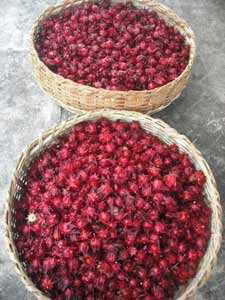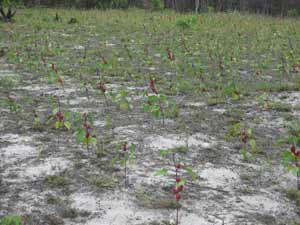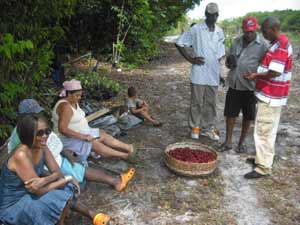 The venture is an enterprise by Highway Producers Association, in collaboration with the Faith Harding Quick Impact Programme (QIP) headed by Dr. Faith Harding.
The venture is an enterprise by Highway Producers Association, in collaboration with the Faith Harding Quick Impact Programme (QIP) headed by Dr. Faith Harding.An agriculturalist working along with the group arrived three months ahead of the schedule time of harvesting and, although this is the first time that the product has been grown on such a large scale, no explanation was offered for the early reaping.
However, the venturers, from the time of sowing the seeds some two months ago, began a process of documenting every aspect and step of the exercise and will soon be making a leaflet available on the project.
Speaking with the media at Long Creek yesterday, Harding said the group and, moreso, the community is extremely happy with the early harvest.
She explained that what was harvested will be transported, today, to the National Agriculture Research Institute (NARI), which had previously given a commitment to assist the group with drying the fruit in preparation for export.
Prospects According to the QIP leader, the prospects are fantastic and the initial set of dried sorrel will be exported to Mexico, through the shipping agent DHL.
According to the QIP leader, the prospects are fantastic and the initial set of dried sorrel will be exported to Mexico, through the shipping agent DHL.
She said Guyana has been attracting much interest in the commodity from the outside world, ever since it was announced that sorrel can be produced on a commercial level.
Harding said Mexico and Germany, among the largest importers of sorrel, are eyeing Guyana as one of the countries from which to source it.
She is confident the sorrel will attract a hefty price as, presently, farmers are likely to be paid US$4 for one pound of the fresh fruit while the dried product is expected to earn US$12 per pound, depending on the moisture content.
Harding reminded that sorrel is being planted on sandy soil by persons who found it hard to put their land to use, despite having the will power. She said, while the lands are available to the people, they do not have the resources to make it marketable and, in cases, some were just wasted.
With QIP help, the plots are now being cultivated and the actively involved owners are the ones driving the day to day operations, while Harding provides support in various forms.
Smiles She said her joy and reward comes from the smiles that are often on the faces of the farmers and their families who, from time to time, realise that they have found an avenue where they can utilise their once dormant spreads in a manner that will see them earning for themselves.
She said her joy and reward comes from the smiles that are often on the faces of the farmers and their families who, from time to time, realise that they have found an avenue where they can utilise their once dormant spreads in a manner that will see them earning for themselves.
She said, while the focus has been on Long Creek, it will be intensified to ensure that there is sustainability. The group will now use the experience gained there as a model for the betterment and more yields at an Amerindian settlement in Region 5 (Mahaica/Berbice), where the community is also engaged in the pursuit.
Twenty thousand seedlings were planted at the latter location some time ago, resulting in a 95 percent germination and Harding said Long Creek will be used as a guide there.
Meanwhile, Michael De Abreu, husband of a land owner at Long Creek, said the initiative is one that will benefit his community tremendously and the successful enterprise has given the members encouragement to continue cultivating the fruit.
Harding launched the QIP last year, aimed at targeting communities full of human and natural resources but not being properly utilised or at all.
The organisation has since been approached by several groups and communities who want to make use of the hidden talent and resources located within but not easily detectable by those living in the same areas.




.jpg)







